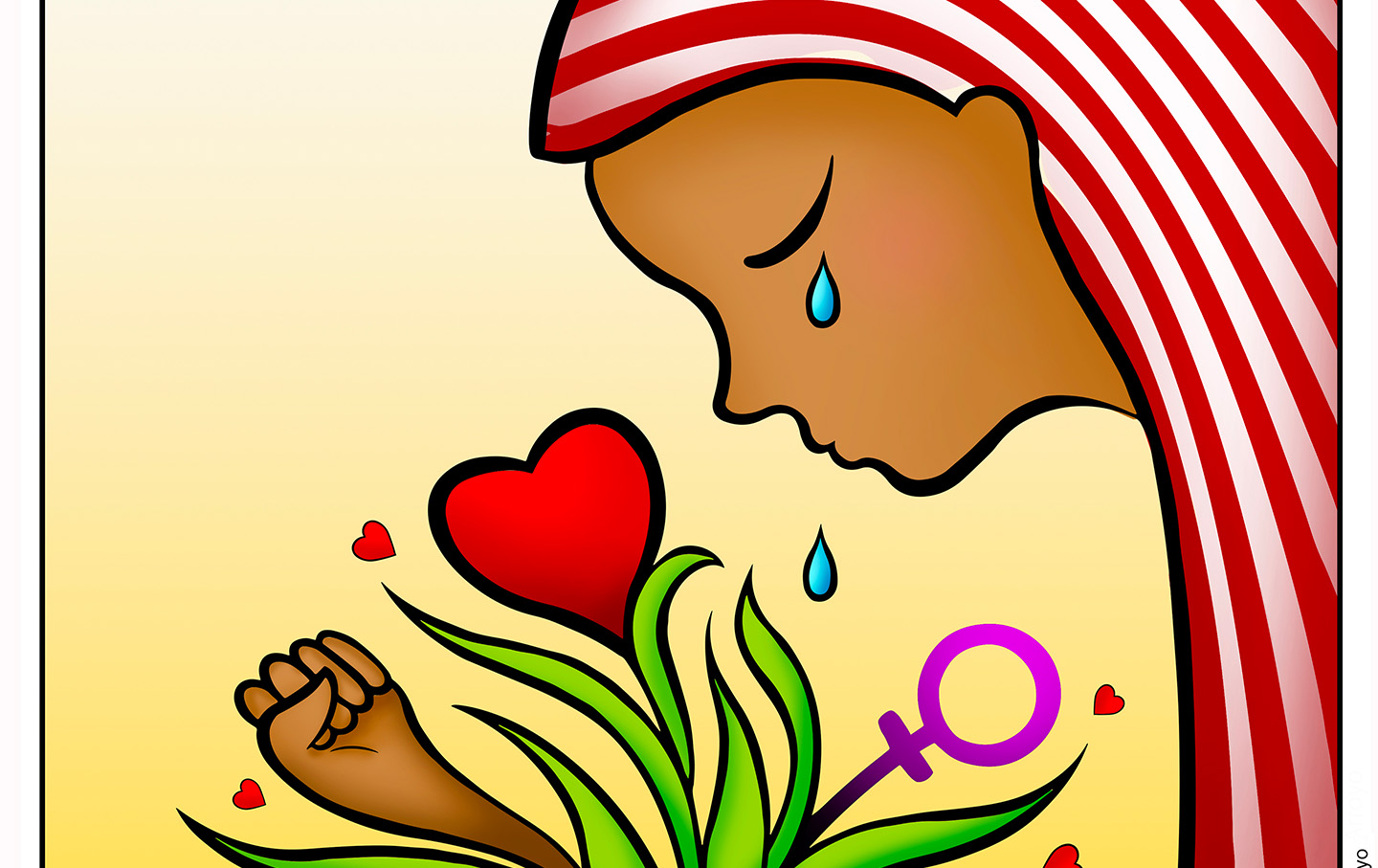The Election Depleted Us. Storytelling Can Revive Us.
As we share our truths and witness each other’s, we build unity and community.
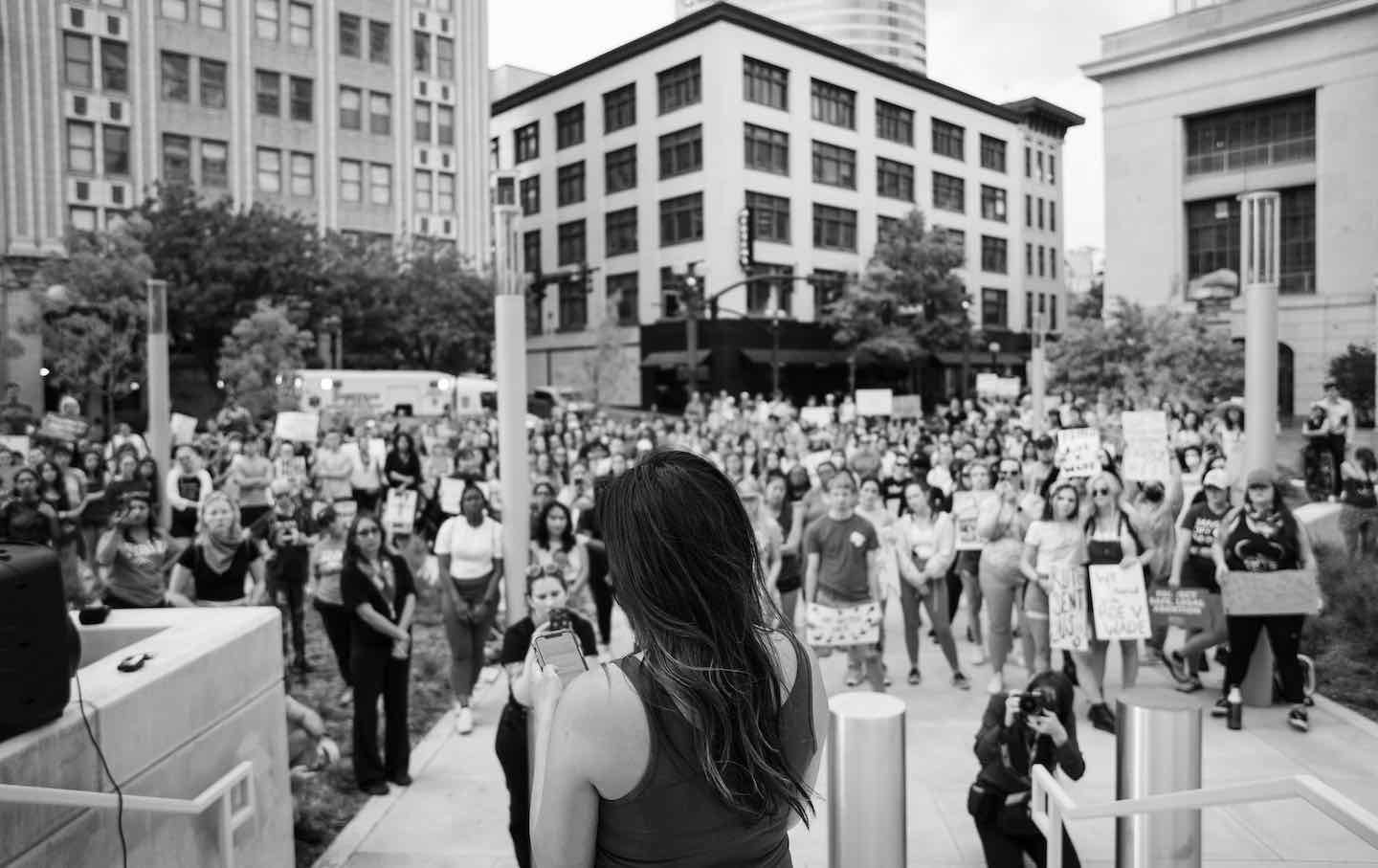
At 1 am on election night, I finally gave up and went to bed. As a mother of two young children, I resolved that even this election wasn’t worth giving up precious hours of sleep. We’ll know more about the results tomorrow, I thought.
But despite my best intentions, it wasn’t a restful sleep. It was as if my body had a built-in snooze button, waking up every 45 minutes just to refresh my news feed. Then the news came in: “Donald Trump Wins Presidency.”
It’s hard to describe the shock I felt. How shocked I was by my own shock. Like millions of others, I really did believe that Vice President Kamala Harris would be our next president. But instead, the unthinkable happened—support for Trump rose in nearly every state. His approach to seed fear, and to vociferously and repeatedly spew violent and abhorrent narratives about the communities we love… worked. It was hard to grapple with it all, and to know that this wasn’t the end of it. Even harder days will come. All of it felt unbearable.
As I thumbed through social media, I couldn’t help but notice a resounding question: Where do we go from here?
I, too, had that question. But I didn’t have an answer for it.
Throughout the day, I found myself deep in thought and pain. The wave of emotions felt like a paralysis, as my mind anxiously went through the possible consequences of the election results.
It wasn’t like me to be so disoriented and consumed in fear. My work requires a deep sense of groundedness and self. As an activist and founder of the nonprofit storytelling agency Rosie, I’ve worked on some of our country’s most heartbreaking issues for years, and have pushed back fervently on them by uplifting stories of hope, truth, and love. But that day, I couldn’t access it. I felt lost.
The more that I sat with these feelings, the more it became clear to me that these sensations were not new. They were a small part of a much larger story, and it had everything to do with how I could move forward.
I had last felt this feeling of despair at a rest retreat that I attended earlier this year, organized by Octavia Raheem, a rest coach for Black, Indigenous, and women of color who are senior leaders, founders, and business owners. The retreat had brought 30 of us together, with the intent to de-script false narratives we’ve subconsciously been living, and re-script a new narrative that centered our truth and the expansive human being that we are.
The retreat center was nestled in the Blue Ridge Mountains, one of the oldest ranges in the world, located right outside of Atlanta, Georgia. The Saura Indians, the earliest known inhabitants of the region, called these mountains “Jomeokee,” which means the “Great Guide” or “Pilot.” Surrounded by stunning vistas, majestic waterfalls, and bright wildflowers—it was as if the colors and lights and patterns of the world had come together to form a special sanctuary for us, and specifically us, to convene.
I knew that I was exactly where I needed to be—I was, after all, at a time in my life where I felt lost and in need of direction.
Without warning, my world had become small. I was going through a sudden and tumultuous divorce with my ex-husband, with whom I share two young children. Life felt unrecognizable. This retreat was my time to find my compass—to see beyond what was fractured and breaking, and return, remember and realign with my true self.
On the top of the Jomeokee mountain, I found community and hope listening to the stories of other attendees—women of color from different parts of the country and all walks of life, who had carried so much sorrow in their lives, and yet they were still here, speaking to their joy. We shared stories of self-crumbling, scattering, and renewing that shifted the energy in the room. Our stories were all very different, and yet the contours of them felt familiar, and the bond we were forming created a healing balm to our collective wounds, past and present.
This experience compelled me to examine not only the stories I was currently sitting with but also the collection of narratives that had shaped me from well before I was born and throughout my life:
My earliest memories of my father, a youth activist who led thousands of students against massive, government-fueled poverty and inequality in the Philippines. With the help of his uncle, he fled to the United States—with stab wounds from police beatings, and a broken heart from leaving his family and his country so abruptly.
My fourth birthday party in a predominantly white area in Texas, where my parents hoped that our proximity to opportunity would protect me and my sisters from their experiences with racism and the world. It was when and where I started to realize how different my deep almond skin looked from everyone around me.
My abduction and rape at a budget hotel in Texas, the victim shaming I experienced from the police when I was found and the resulting pregnancy I had to deal with as a 16-year-old girl.
These experiences were monumental chapters in my life. But it wasn’t the trauma that kept me feeling small and stuck—they reflected broader societal messages that had been fed to me at a young age, and reinforced over time about what I did and didn’t deserve. Narratives that stripped me of my power and potential, and threatened to keep me hopeless, small, and stuck.
I felt this during the first Trump administration and throughout his campaigns. On Wednesday, my body was preparing for it again.
I am not alone in this cycle of unworthiness. We are all born into generational trauma and conditioned to accept it as defining parts of our lives. It is embedded in our experiences as residents and citizens of a country that exists on stolen land. And as we grow up, we live and breathe the toxic ideas all around us, through movies and other entertainment, workplaces and family, government and religion, the media and, yes, presidential campaigns. It poisons our beliefs about who we are, who belongs and who does not. It limits us, and silences parts of us.
Popular
“swipe left below to view more authors”Swipe →We see this in the way trans issues are reported in the press, from a place of “otherness” and despair rather than from a place of expansiveness and fullness, reflecting the whole human beings that trans people are. We also see this in the way that abortion stories are told through a wealthy, white, heteronormative lens, ignoring the fundamental reasons people have abortions and the underlying problem of racial and ethnic disparities across an array of sexual health indicators.
These persisting narratives drown out the many nuances and intricacies of our lived experiences with issues like abortion access, gun violence, trans rights, and more. Without these truths, we are given a flawed picture that encourages fear and division, one-dimensional stereotypes, and accusations—the exact behaviors and ideas that inform destructive policies and politics, and fuels authoritarian power.
In a system deeply entrenched in capitalism, most of us have no choice but to put our heads down and work, produce, and survive, leaving no time or capacity to interrogate the meaning of it all. We are losing hope, and it’s depleting us.
But we can change this cycle—it starts with telling our stories.
To restore the humanity of our nation, we have to restore it in ourselves. Uplifting the fullness of our experiences, and the experiences of others—particularly those from communities of color and who face significant barriers—allows us to reclaim the truths inside of us and see what is real and present. It helps us get clear on the world we want and how we get there, rather than only fighting against the world we don’t want. It allows us to push back on the reductive narratives that have been given to us, and instead, step into our truth and our power. Our storytelling is an investment in our collective liberation—our push to create a world that we all deserve.
In times of division, we are led to believe that we are alone in our experiences, that the reason for our pain is not at all oppressive systems but rather something that we did. It’s the hallmark of America’s individualistic society. But the truth is, every single one of us is suffering under the weight of capitalistic, racist, and sexist systems. Our exhaustion, isolation, and constant disorientation at the utter chaos of it all keeps us from recognizing it.
I know there is not a singular answer here that will solve all the problems ahead; there are, in fact, thousands of them. And they live in the wisdom of our own stories—our own truths.
I’ll never forget the words that Octavia whispered during the rest retreat: To know your truth, you must hear it. I believe this. As we share our truths and witness each other’s, we build unity and community. And it is the collection of these built communities—down to our smallest circles of friends—that will help us create a robust people-centered movement that is powerful enough to push back on fear and isolation, lead with love, and combat autocratic forces once and for all.
We cannot back down
We now confront a second Trump presidency.
There’s not a moment to lose. We must harness our fears, our grief, and yes, our anger, to resist the dangerous policies Donald Trump will unleash on our country. We rededicate ourselves to our role as journalists and writers of principle and conscience.
Today, we also steel ourselves for the fight ahead. It will demand a fearless spirit, an informed mind, wise analysis, and humane resistance. We face the enactment of Project 2025, a far-right supreme court, political authoritarianism, increasing inequality and record homelessness, a looming climate crisis, and conflicts abroad. The Nation will expose and propose, nurture investigative reporting, and stand together as a community to keep hope and possibility alive. The Nation’s work will continue—as it has in good and not-so-good times—to develop alternative ideas and visions, to deepen our mission of truth-telling and deep reporting, and to further solidarity in a nation divided.
Armed with a remarkable 160 years of bold, independent journalism, our mandate today remains the same as when abolitionists first founded The Nation—to uphold the principles of democracy and freedom, serve as a beacon through the darkest days of resistance, and to envision and struggle for a brighter future.
The day is dark, the forces arrayed are tenacious, but as the late Nation editorial board member Toni Morrison wrote “No! This is precisely the time when artists go to work. There is no time for despair, no place for self-pity, no need for silence, no room for fear. We speak, we write, we do language. That is how civilizations heal.”
I urge you to stand with The Nation and donate today.
Onwards,
Katrina vanden Heuvel
Editorial Director and Publisher, The Nation
More from The Nation
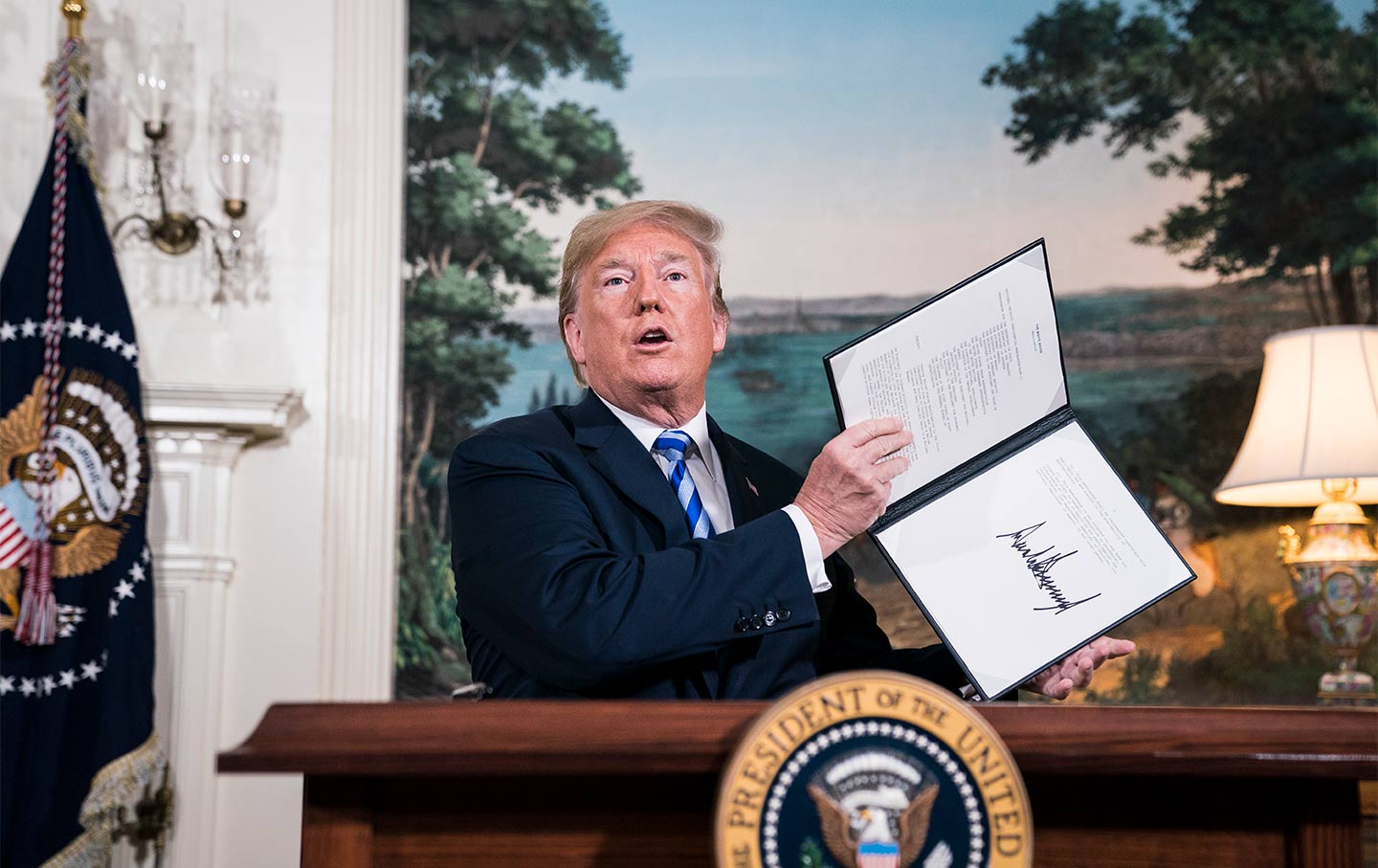
What Will a Peace Movement Look Like Under Trump’s Second Presidency? What Will a Peace Movement Look Like Under Trump’s Second Presidency?
An all-hands-on-deck approach to the coming world of Donald Trump and crew is distinctly in order.
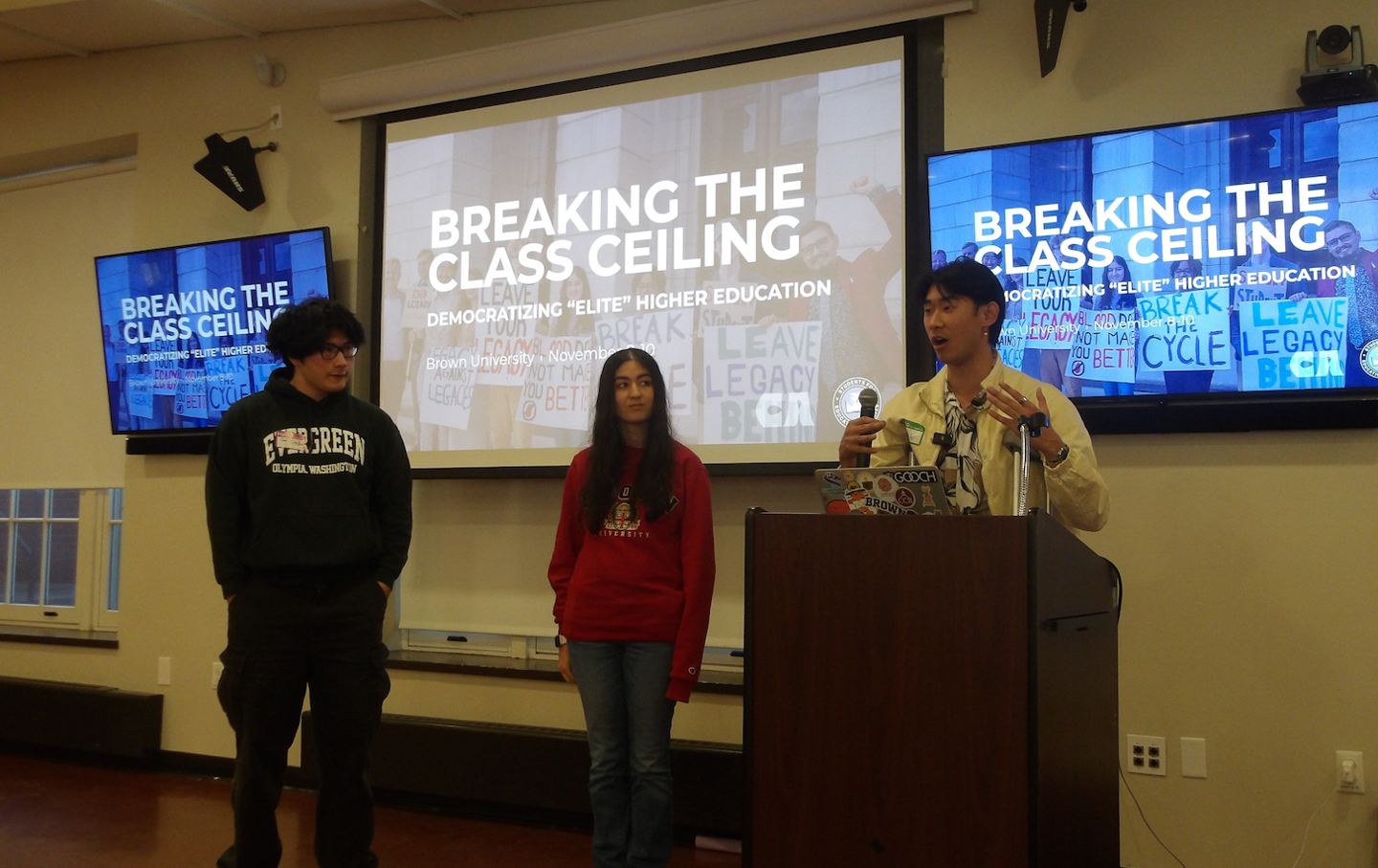
The Elite College Students Fighting to End Legacy Admissions The Elite College Students Fighting to End Legacy Admissions
In November, organizers at more than 18 universities met for a conference with Class Action to discuss how to democratize higher education.
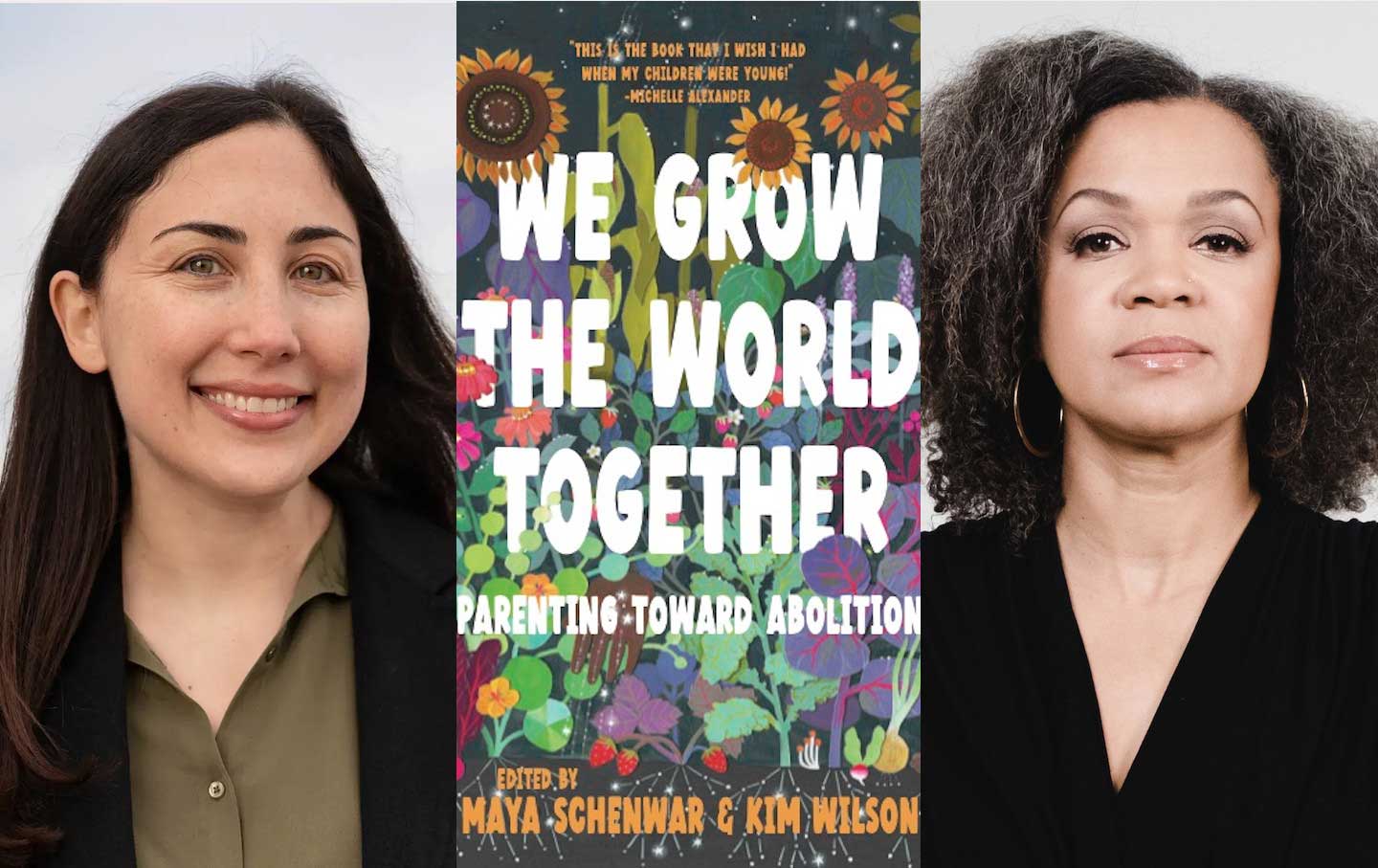
How Love Fuels Resistance: Parenting for Liberation How Love Fuels Resistance: Parenting for Liberation
Maya Schenwar and Kim Wilson discuss their new anthology, We Grow the World Together, about how caregiving and the organizing work of abolitionists can go hand in hand.

Tell Me What You’re Feeling… Tell Me What You’re Feeling…
Cartoonist Mahasen Al-Khatib killed in Gaza strip bombing.

Patriarchy Has Got to Go Patriarchy Has Got to Go
Check out all installments in the OppArt series.

